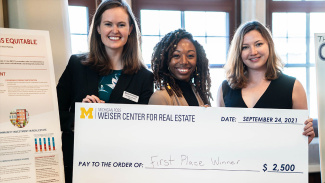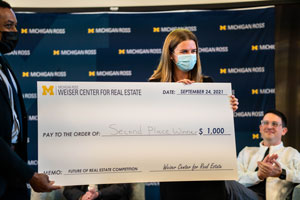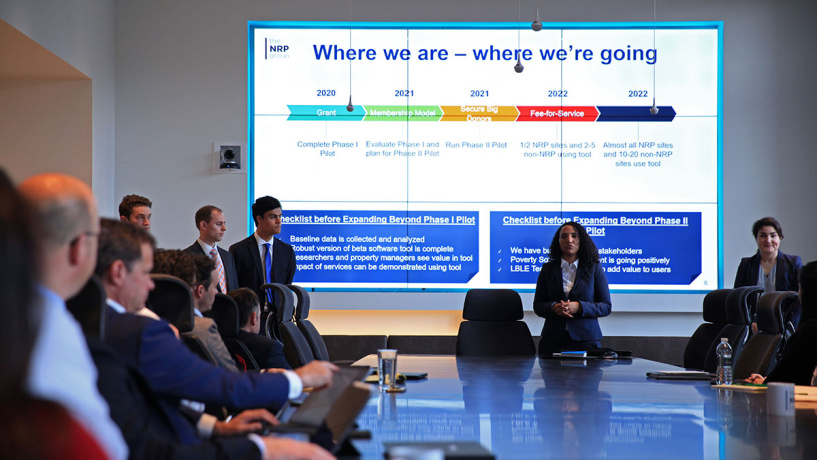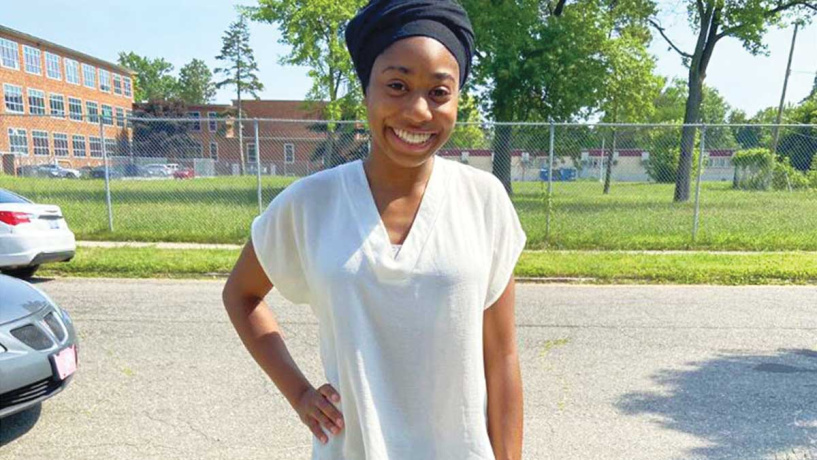Inaugural Event By the Weiser Center Challenges U-M Students to Develop Impactful Ideas About the Future of Real Estate

As industry leaders prepare to navigate the future of real estate, graduate and undergraduate students from the Ross School of Business and across the University of Michigan presented their own visions as part of the first event organized by the Weiser Center for Real Estate at Michigan Ross.
The newly launched Weiser Center seeks to serve as a hub for all things real estate at the U-M, creating programming and hosting events that engage students, faculty, and alumni with those in the industry. The center’s mission is to connect the next generation of real estate professionals with the tools necessary to make a positive impact on built environments in the U.S. and across the globe. The center is led by Jake Albers, managing director, and Marc Norman, faculty director and director of real estate initiatives and associate professor of practice at Taubman College.
The Future of Real Estate Competition
For its inaugural event, the center’s Future of Real Estate Competition asked U-M student teams to showcase their perspectives on a complex issue, challenging them to envision what the future holds for the spaces where they work, live, and play. Fifteen teams composed of students from Michigan Ross and other U-M programs participated in the competition. They included students from the Bachelor of Business Administration, Full-Time MBA, and Weekend MBA programs; along with students from the College of Literature, Science, and the Arts, the Taubman College of Architecture and Urban Planning, and the Ford School of Public Policy.
Students were tasked with developing engaging posters and abstracts illustrating their ideas for the future of real estate. Their work was reviewed by an interdisciplinary panel, including Brian Finerty, BBA ’97, chief investment officer at Equity International; Kelly Vickers, MBA ’11, chief housing development and investment officer for the City of Detroit; Lily Gonzalez, MUD ’14, development design specialist at Cinnaire; and Zachary Sheinberg, JD ’97, managing partner at Wind Raven and lecturer of finance at Michigan Ross. Judges rated students based on clarity of information, graphic design, multidisciplinary approach, demonstration of knowledge, and innovation.

The winning teams were announced at the 35th Annual Michigan Real Estate Convention at U-M. First place went to a team of Michigan Ross Full-Time MBA students — Alexandra "Lexx" Mills, MBA/MURP ’22; Caroline Lehman, MBA ’23; and Evalynn Rosado, MBA ’23 — for their idea The Future of Real Estate is Equitable. Second place went to Lindsay Keare, MBA/MPP ’23, for The Future of Accessory Dwelling Unit Financing. Third place went to Maya Baker, MURP ’23 and Alex Van Kuiken, BS ’23, for The Future of Real Estate is Cooperative.
“Participating in this competition was challenging and deeply rewarding. I really enjoyed working with my team to develop a shared vision of what we wanted the future of real estate to look like,” said Mills. “Our vision was rooted in our commitment to equity. We worked hard to not only communicate a desired future, but what we see as a real path to achieve it backed by research and policy solutions.”
Michigan Ross alum and judge Finerty said he was very impressed by all the teams’ submissions and the overall value of the competition.
“The Future of Real Estate Competition allows students to flex their creative muscles and forces them to research, choose a thesis, and create a coherent and convincing message around that thesis,” he said. “The willingness to put oneself out there to be judged, critiqued, and hopefully rewarded, is at the heart of any strong investment or decision-making process. I encourage all students to do this as often as possible; the more repetition, the better the results.”
Michigan Ross winners: The Future of Real Estate is Equitable
After being named the winners, the Michigan Ross MBA team shared why they participated in the competition, what they were able to take away, and how it fits into their business school and future career goals.
“The Future of Real Estate Case Competition allowed me to bring my experience in architecture and equitable development to Michigan and collaborate with my peers outside of the classroom,” said Rosado. “We each care deeply about equity and community investment and believe in the business case for both. For me, the case competition was also an opportunity to highlight that the future of real estate can, and should be, led by people with diverse backgrounds, especially women.”
Mills said the Future of Real Estate Competition directly relates to why she is pursuing her MBA and master’s degree in urban and regional planning at U-M: her goal is to start a company that invests in businesses and real estate in Black communities as a platform for economic development and generational wealth building.
As someone who came to graduate school with a very clear vision of the impact I wanted to have in the real estate industry, this competition was an awesome opportunity to share that vision with the world. It was like a capstone that allowed me to utilize what I have learned in both of my degree programs, and I found it truly valuable
Weiser Center’s first event illustrates its values and future programming
After a successful inaugural event, Albers said the Future of Real Estate Competition is a great example of what to expect from the Weiser Center and it aligns with the center’s core values. He also said the event provided valuable insight into what future programming should entail.
“The Future of Real Estate Competition fostered interdisciplinary collaboration with students from a wide range of academic backgrounds participating, which is a central facet of the Weiser Center’s mission,” said Albers. “By bringing together a panel of judges from across the industry, many of them alumni, our students received feedback and insights on their submissions from those in the field, another key focus of the center. And, finally, because we let the students choose their topic, we gained a critical understanding of which areas of real estate they find most interesting. This is important to us not only as we launch, but throughout our evolution as a center.”
Likewise, Noman said the focus on interdisciplinary collaboration is what makes the competition and the center unique.
“There is a traditional view of real estate that puts the focus on finance, profit, and markets,” he explained. “Under that thinking it is perfectly fine for it to be siloed in a business school, and specifically in finance. The competition, for us, was a way to showcase the ways real estate and development touches every discipline. It also provided a way for students from all over campus to collaborate and examine how larger trends weave through many sectors."
The new hub for real estate at U-M
Beyond fostering interdisciplinary collaboration, Albers said the Weiser Center will provide students with educational and professional development opportunities and support applied research responsive to the needs of industry and policy makers.
A number of new activities and programs are planned to be hosted by the Weiser Center. Among those programs are the Blau Career Development Series, a speaker series, and a Professional in-Residence program to support students along their professional journey.
Additionally, the Weiser Center will work closely with Taubman College, which oversees the undergraduate minor and a graduate certificate in real estate development that are open to Michigan Ross students.
The Weiser Center was established by a $10 million gift from U-M Regent Ron Weiser, BBA ’66, in 2020.
As a center, we are lucky to have major gifts that align with the goals of supporting access, opportunities, and exposure to real estate for a broad range of students. Embedded in these goals is an ambition to be the locus of knowledge, research, innovation, and pathways in real estate at U-M; its students, alumni and its faculty.
Learn more about the Weiser Center for Real Estate
Engage with the Weiser Center for Real Estate
Learn more about the winners of the Future of Real Estate Competition







